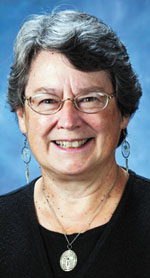By Corinne Winter

On July 13, 12 married men of this diocese will be ordained to the permanent diaconate while two single men who are preparing for priestly ordination are ordained as transitional deacons. Ordination of married men to the permanent diaconate in the Latin rite of the Catholic Church is possible today precisely because of the work of Vatican II and its subsequent development. Lumen Gentium chapter 3 cites the need for the administrative and charitable works proper to the deacon as the reason for restoring an ancient tradition of the Church in a way appropriate for the contemporary world. There were deacons in the Church during the early centuries. In fact, deacons at one time held an administrative role that was more prominent than that of the presbyter. However, gradually, presbyters (priests) took over more of the roles that had been proper to the deacon, some deacons were ordained as priests, and the diaconate came to be viewed strictly as a step on the way to priestly ordination.
Why does this history matter to us? The Church’s definition of the offices that are part of its work is inherently connected to the Church’s understanding of its own being and mission in the world. The history also shows that the administrative and ministerial structure of the Church has and continues to develop as the Church discerns and responds to the needs of the world.
The role of the deacon in the Church, both within and beyond the liturgy, is one of service. While we must be careful not to oversimplify, we read as applicable to the meaning of the diaconate accounts in the Acts of the Apostles and in some of the Epistles of deacons seeing to the needs, for example, of widows in the Church. By ordaining some who, in their ordained ministry, will see to physical as well as spiritual needs of a wide variety of people, the Church declares such service to be inherent to our mission. Therefore, we cannot view the needs of any group as outside of our concern. We have a moral obligation, as Christians, to care about and to do what we can to meet especially the needs of the poorest.
The ordination of permanent deacons who are married and many of whom have other jobs also attests to the diversity of roles and expressions of holiness that are essential to the full realization of the Church and its mission. In the time just prior to Vatican II, many lay people, at least, were tempted to view the clergy/laity distinction as a division between the truly holy and those who tried to follow as best we could, albeit at a distance and in a lesser way the teachings received from the hierarchy. We often lost sight of the holiness of marriage and family life, in particular. Holiness became associated with separation from the world rather than with efforts to transform that world by work as well as by prayer and preaching.
Others have written columns for this paper addressing the continuing effort to appreciate fully the role of the deacon in the Church. I would add only the thought that the struggle itself has value as it requires continuing reflection on the work of the Church and the relationships among those who undertake different aspects of that work. As our current pope speaks frequently and boldly about the call of the Church to be for the poor and of our need to address a culture of greed, it seems that the commitment to service that is represented by the deacons and their ordination is likely to be very important as are the works and witness of many others who serve.
(Corinne Winter is a professor of theology at St. Ambrose University in Davenport.)







